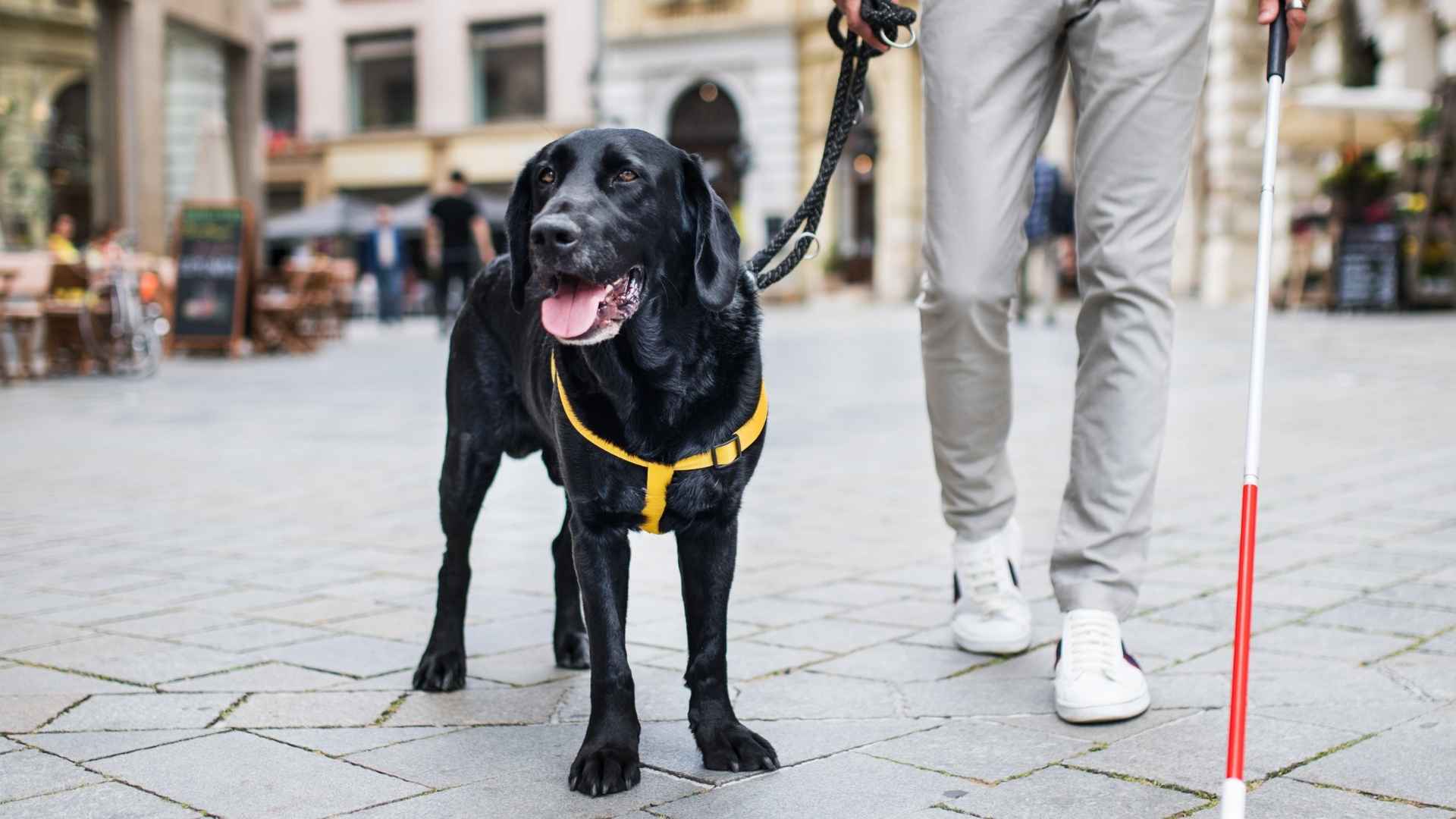Imagine a companion who knows when you need help, before you even ask. A dog that doesn’t just walk beside you, but works beside you with devotion, intelligence, and instinct. That’s the beauty of a devoted service dog.
While Retrievers are often the first to come to mind, many dog breeds excel as service animals. Service dogs can be trained as guide dogs for the visually impaired, hearing dogs for the deaf, or medical alert dogs that detect health emergencies.
These remarkable canines aren’t just well-trained — they’re emotionally attuned, fiercely loyal, and driven by purpose. But not every breed is cut out for the job. It takes a unique mix of calm temperament, sharp intelligence, empathy, and dedication.
We will explore the most devoted service dog breeds — dogs who are more than companions; they’re lifelines. Whether you’re looking for assistance or simply want to admire the incredible bond between humans and service dogs, this guide will show you the 7 best service dog breeds that go above and beyond, with love in every step.
Devoted Service Dog Breeds
1. Golden Retriever

Golden Retrievers are the golden retrievers of the service dog world. That’s right — they’ve set the bar so high, other breeds are still trying to catch up (with a treat in their mouth, of course). These dogs are all heart. From their silky coats to their soft brown eyes that seem to say, “I got you, buddy,” Goldens are the emotional support dream team.
Goldens are known for their intelligence and empathy, which is why they frequently thrive as service or therapy dogs. According to DogTime, it’s no surprise they consistently rank among the top ten most popular dog breeds in the United States!
They’re gentle, smart, and tuned in to your emotions like a fluffy therapist who accepts payment in belly rubs. Whether they’re guiding the visually impaired, helping someone manage anxiety, or just being a steady presence during a tough moment, Goldens excel at being there — like, really being there.
Why do they shine as good service dogs
✔️ Patient and calm — even when toddlers dress them in sunglasses
✔️ Exceptionally obedient — they listen better than most people
✔️ These emotional support animals tuned in to human emotions — your feelings are their feelings
And let’s be honest, if Golden Retrievers had a motto, it would probably be:
“I can help with that. Also, can I have that sandwich?”

Goldens are energetic dogs that thrive with regular physical activity and mental challenges to keep them content and in good health. They’re also relatively quiet, barking only occasionally, and they typically don’t have a habit of digging up the yard.
Goldens are typically easy to train thanks to their gentle nature and strong desire to please, making them an excellent choice for first-time dog owners.
2. Labrador Retriever
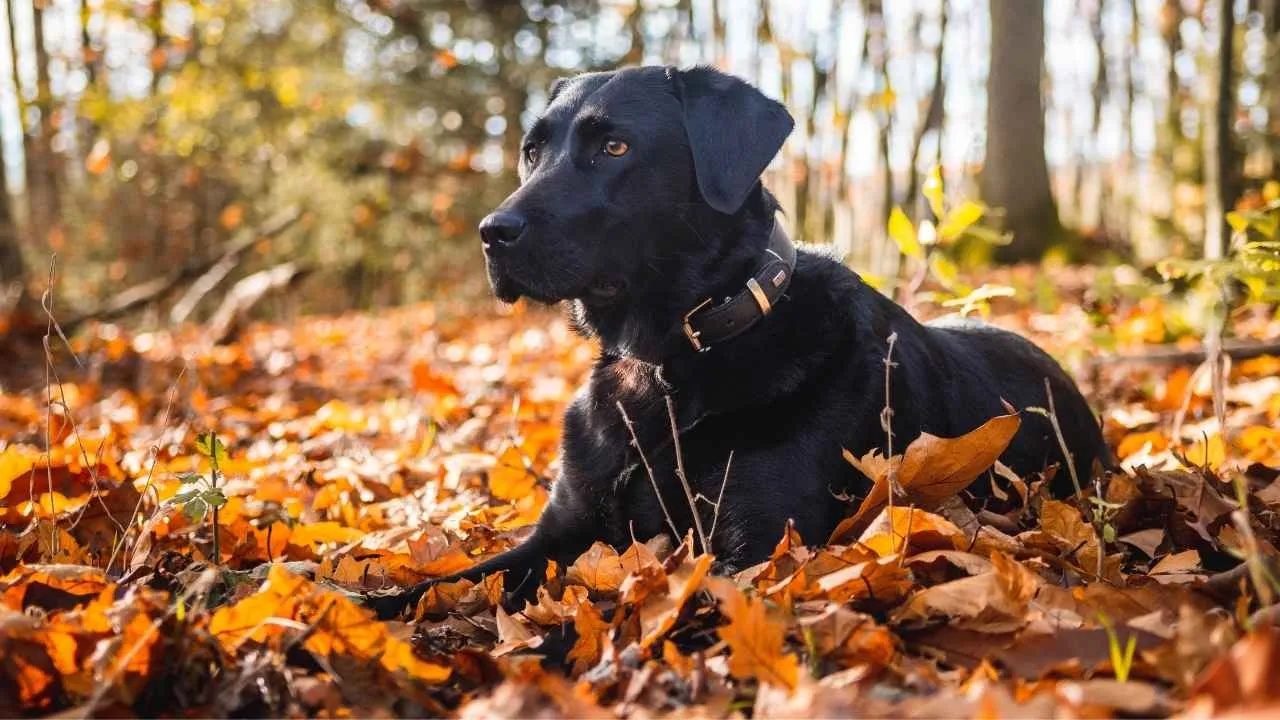
If Golden Retrievers are the emotional support crew, Labrador Retrievers are the multitasking superheroes. Labs are so versatile, you’d swear they’ve read your to-do list and already done half of it.
Need a guide dog? Got it.
Medical alert dog? No problem.
Emotional support after a rough day?
WebMD notes that they’re known as gun dogs because they were originally bred to retrieve game animals shot by hunters, which makes them excellent companions for hunting activities.
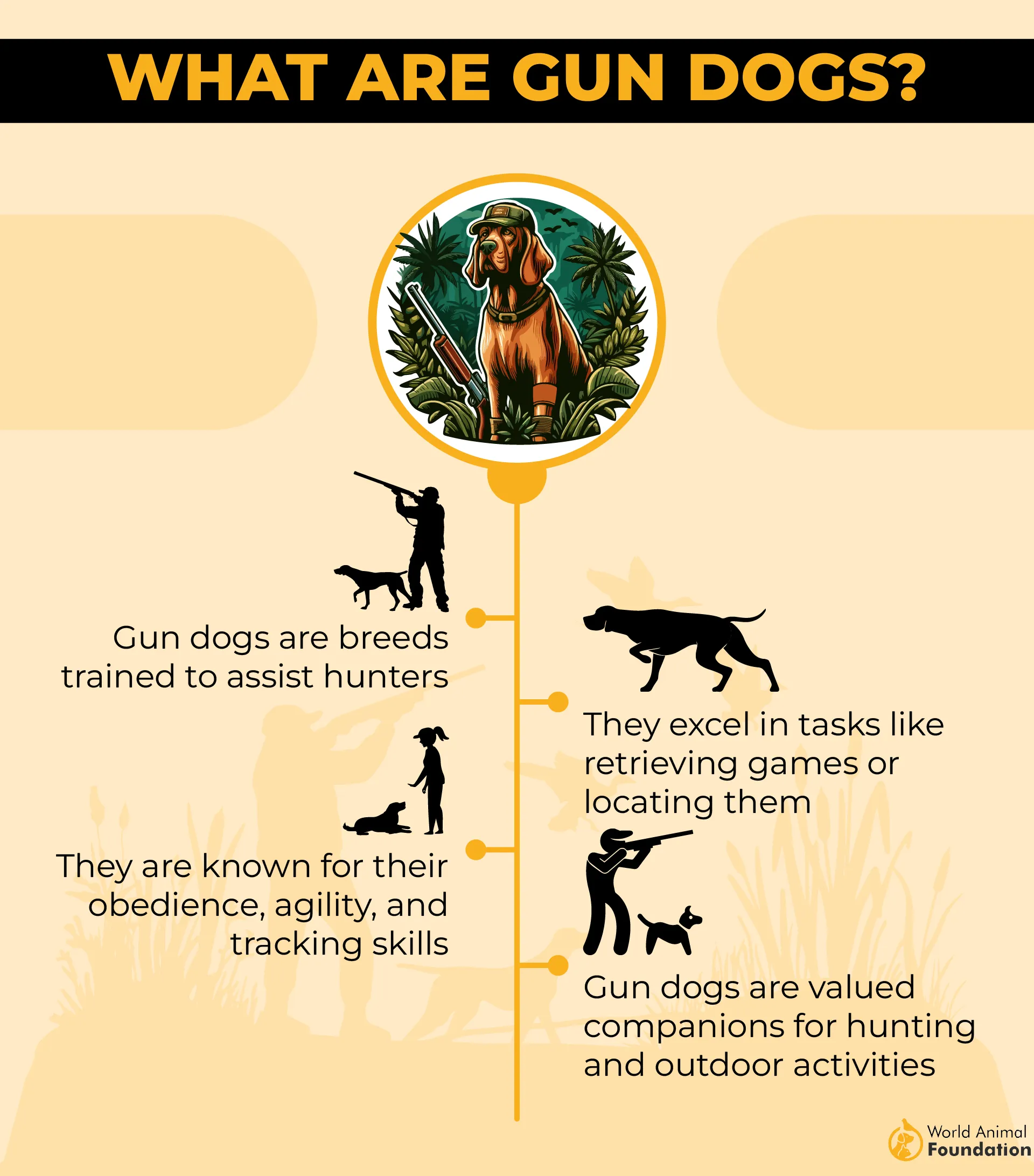
They’re already on your lap… or trying to fit on your lap. Labs are super smart, highly trainable, and born people pleasers. Their eager-to-please attitude makes them a top choice for organizations training service dogs.
These qualities make them excellent candidates for specialized roles, such as service dogs, therapy companions, or working in search and rescue missions. Their versatility, loyalty, and loving temperament are just a few reasons why they’re one of the most popular breeds around.
They’re goofy when off-duty and laser-focused when they’ve got a vest on. And let’s not forget: they’re the kind of dogs who’d bring you your slippers, your meds, and your remote… and maybe eat a piece of pizza on the way, but hey, nobody’s perfect.
Why they’re top-tier service dogs
✔️ Quick learners — they ace training like it’s their favorite game
✔️ Super social — love people more than squirrels (usually)
✔️ Adaptable — equally great in city apartments or sprawling farms
Honestly, if Labs could talk, they’d say:
“Let me help you. Also, I definitely didn’t eat that cookie. Okay, maybe half.”
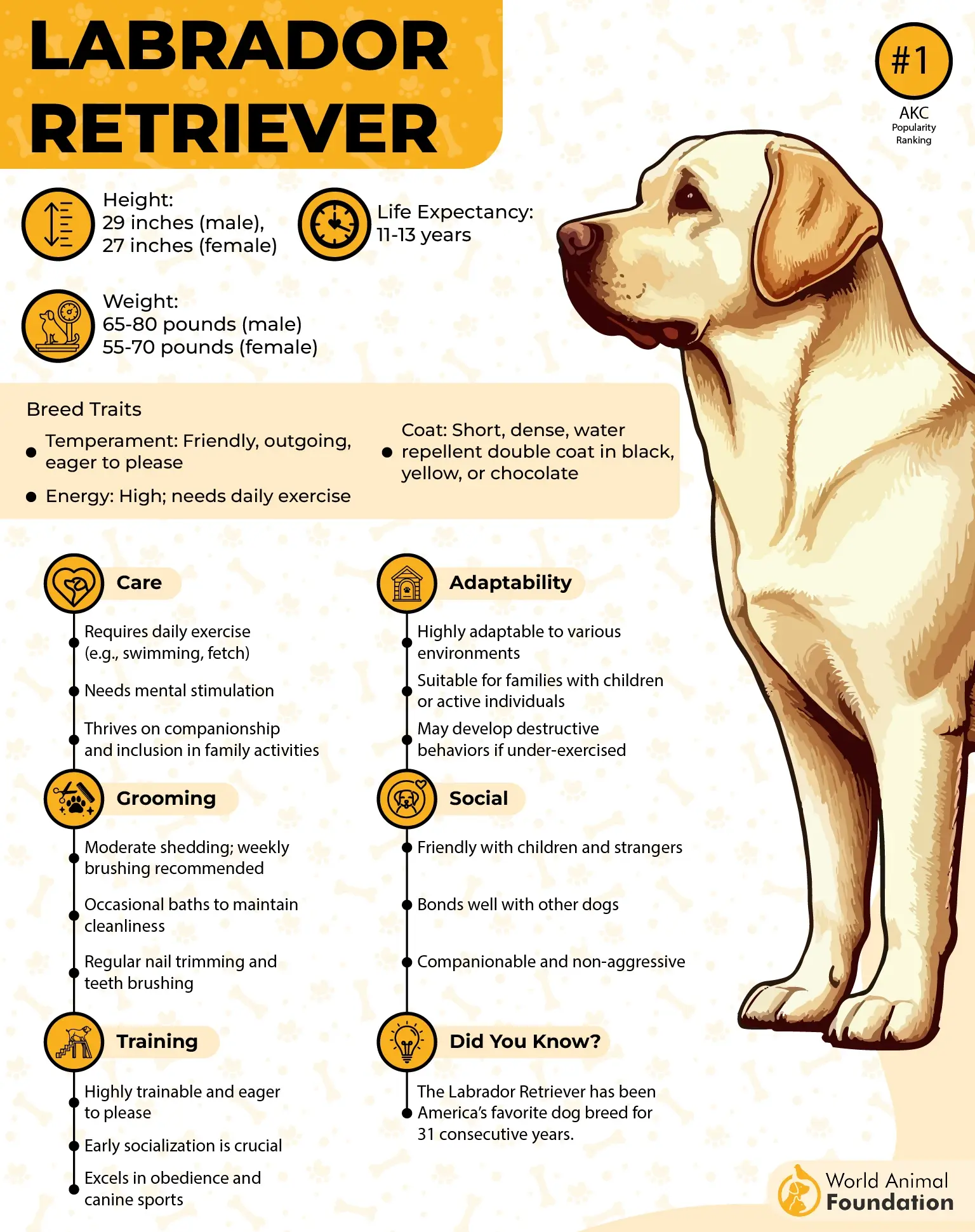
Labrador Retrievers make wonderful family pets because they thrive on human companionship and often struggle when confined to kennels for extended periods. They’re happiest when they’re part of daily family life.
Labrador Retrievers thrive on daily activity and plenty of human interaction—regular exercise and quality time are key to keeping them happy and well-balanced
3. Collie
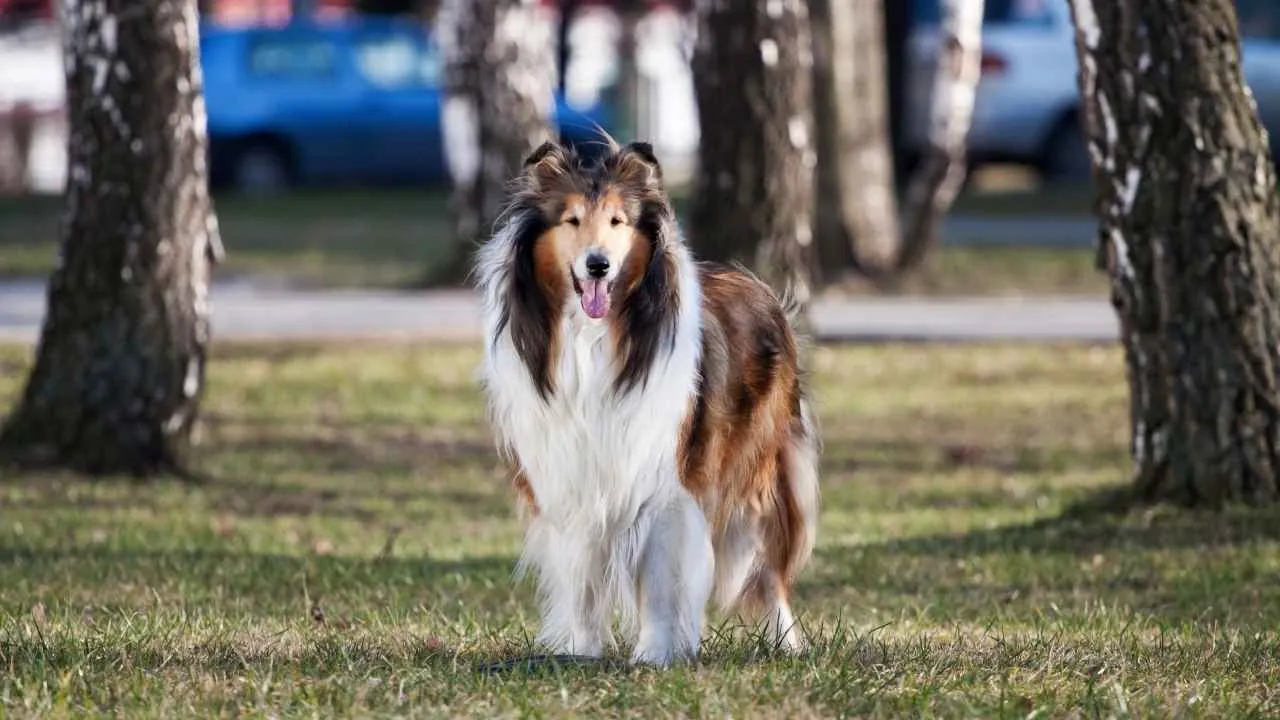
When you hear “Collie,” chances are your brain immediately jumps to Lassie, the world’s most famous canine lifeguard. And let’s be honest — Collies have been doing the “saving humans” thing since before it was cool.
These graceful, long-nosed beauties are more than just a pretty coat; they’re wicked smart, loyal to a fault, and always alert. Known as the all-American family dog, the Collie is beloved for its friendly demeanor and unwavering loyalty. Today, it ranks within the top 50 most popular dog breeds, according to the American Kennel Club.
Collies are great service dogs because they’re intuitive, gentle, and practically born with a sense of duty. They’re especially good with kids and families, and they have this uncanny ability to know when something’s off — like your emotional state or the suspicious lack of treats in your hand.
Collies are deeply family-oriented and will bond with everyone in the household. While they may become protective of their loved ones around strangers or other animals, they typically don’t resort to growling or biting, preferring to keep things calm and friendly.
Why Collies are service dog material
✔️ Highly sensitive — they’ll notice you’re sad before you do
✔️ Natural protectors — no drama goes unnoticed on their watch
✔️ Easy to train — especially when treats and praise are involved
And yes, if Timmy ever fell in the well again? A Collie would still handle it better than 911.
Collies are generally not known for being aggressive, though they may occasionally nip at ankles or heels when excited, a behavior that harks back to their herding days. It’s just their way of keeping things in motion!
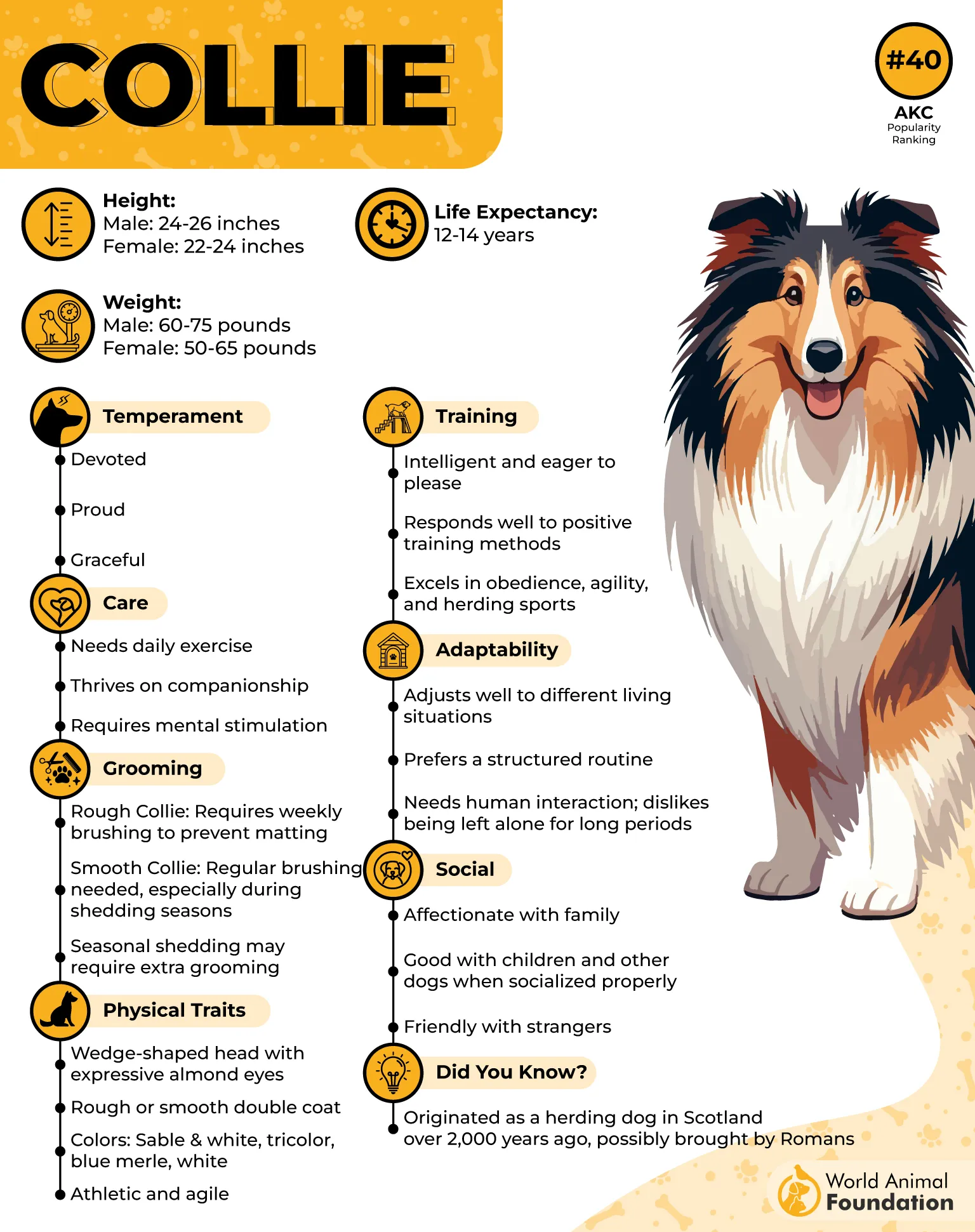
Collies have a high energy level and need at least an hour of outdoor exercise each day to stay mentally and physically fit. After burning off some energy, they tend to calm down and enjoy spending quality time with the family indoors.
According to PetMD, Collies thrive on bonding with their humans and often excel in activities like obedience, agility, and herding work, thanks to their intelligence and strong desire to please.
4. Beagle
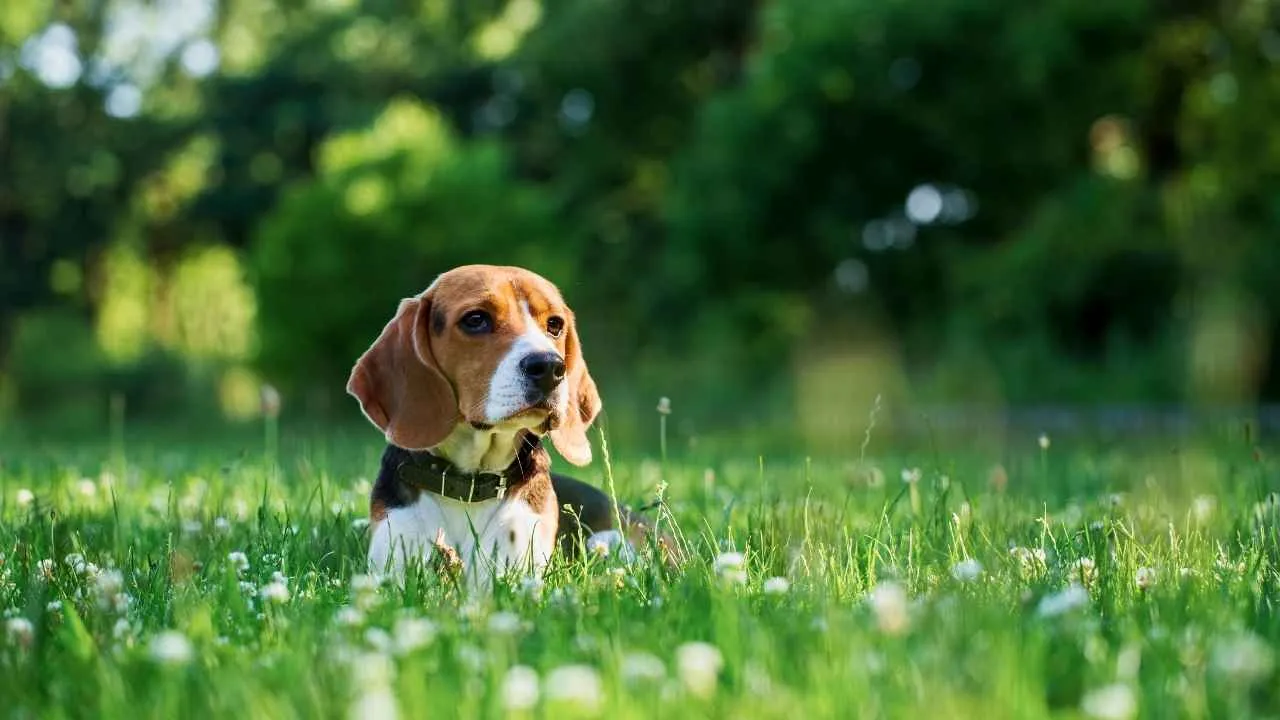
Beagles might not be the first breed that comes to mind when you think “service dog,” but these little guys are serious sniffing professionals with loyalty built into their DNA.
Originally bred to hunt in packs, Beagles are social, determined, and curious — three traits that make them great at scent detection and emotional support work.
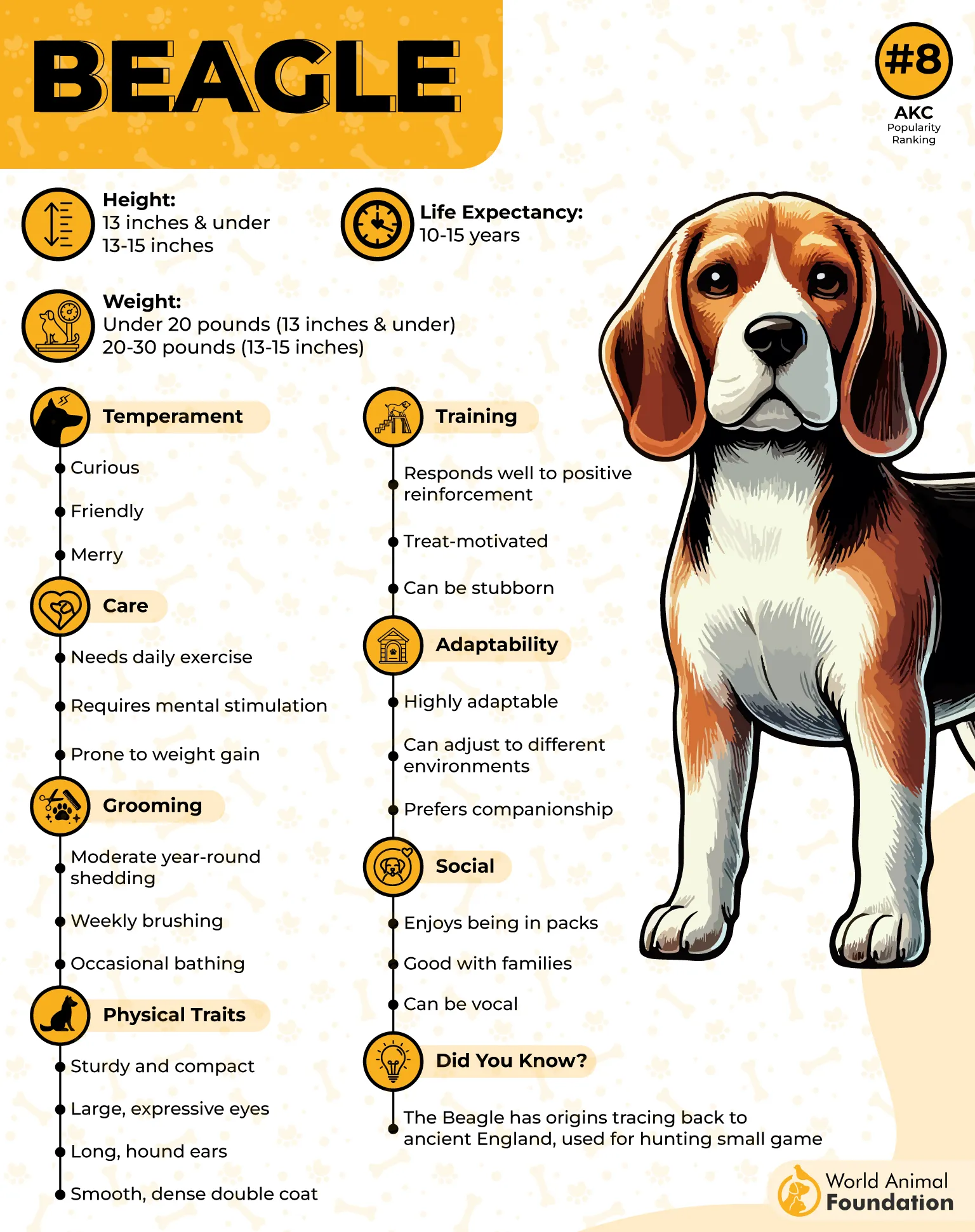
They’ve got that puppy-dog face that could melt stone and ears that somehow make everything better. Beagles are especially great for people who want a smaller service dog with a big personality and even bigger devotion.
Why Beagles make the cut
✔️ Incredible sense of smell — could probably find your keys, your socks, and your will to live
✔️ Compact and adaptable — perfect for small homes or apartments
✔️ Cheerful demeanor — their tail wags could power small cities
Just know: if you leave food unattended, your Beagle will consider that a service task.
They are excellent watchdogs due to their tendency to bark or howl at unfamiliar situations, alerting you to potential intruders. However, they’re not the best guard dogs, as their loud vocalizations are unlikely to intimidate anyone.
5. Boxer
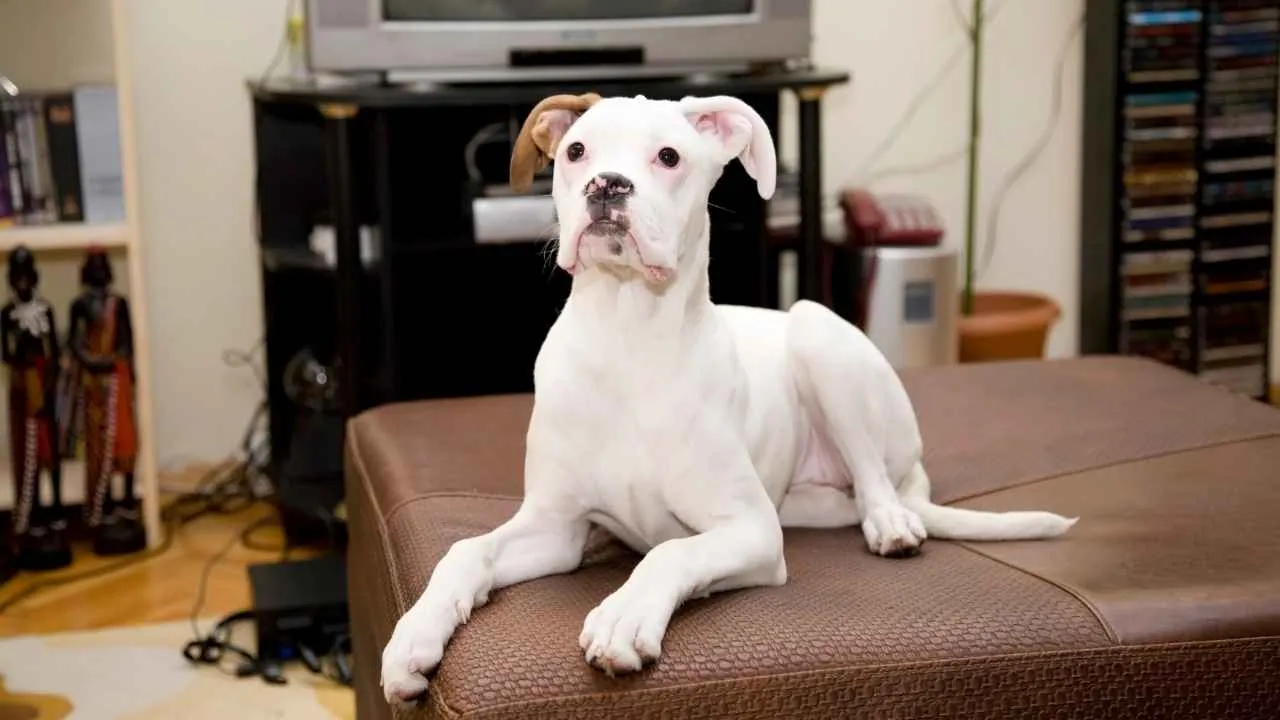
Don’t let the name fool you — Boxers aren’t fighters, they’re lovers. Behind that muscular build and alert stance is a total goofball who just wants to love you, protect you, and maybe sit on your lap like he’s a Chihuahua.
Boxers are intensely loyal, great with kids, and naturally protective — all traits that make them excellent service dogs, especially for individuals needing mobility support or emotional stability.
These medium-sized dogs are smart (but stubborn), affectionate (but drooly), and always on alert for anything that might upset their human. Plus, their clownish energy adds some comic relief to serious moments. Who wouldn’t want a dog that makes you laugh and has your back?
Why Boxers are good service dogs
✔️ Protective and loyal — no nonsense gets past them
✔️ Strong enough for physical support tasks
✔️ Loving goofballs — they bring joy even when they’re snoring like a freight train
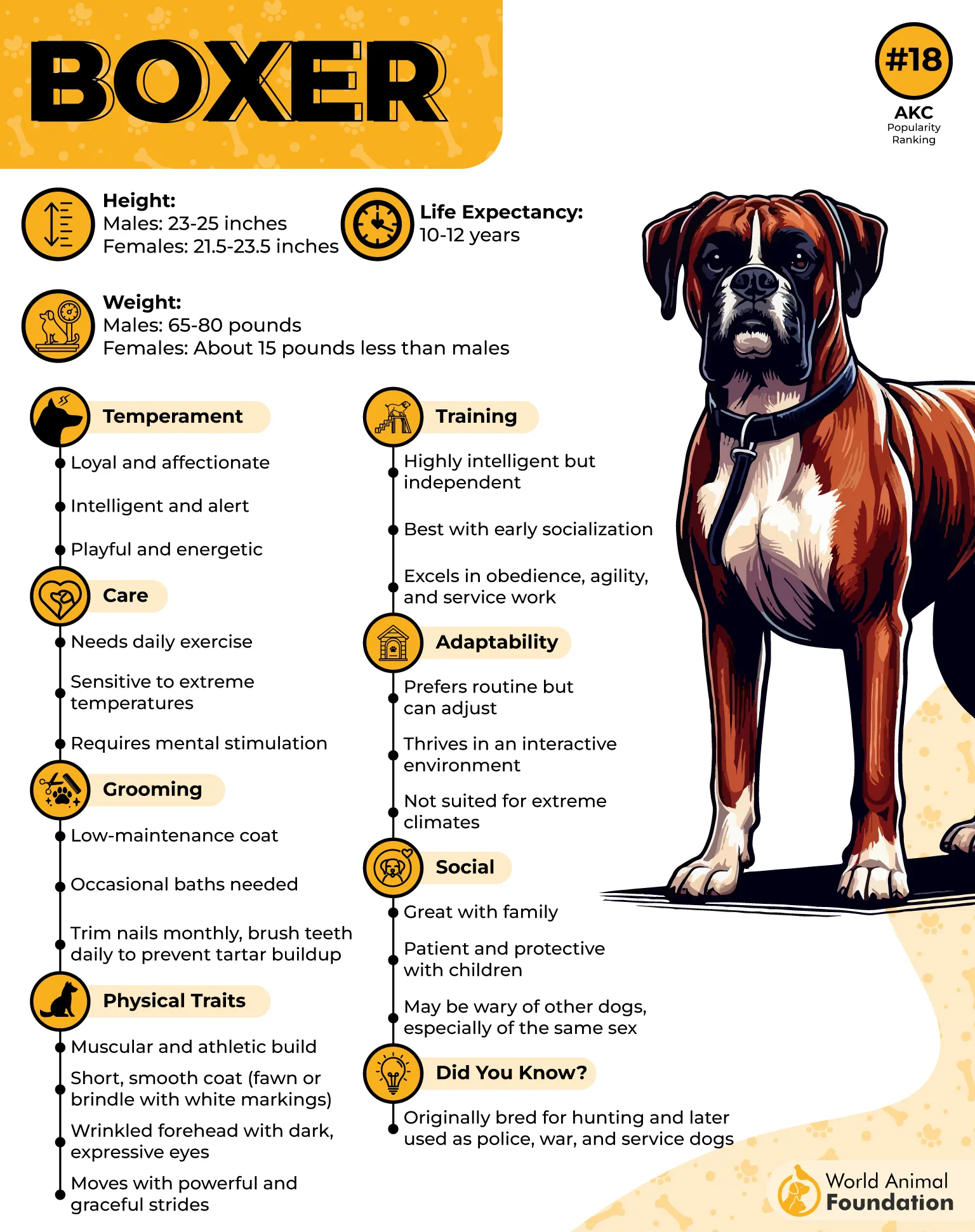
Boxers can excel in dog sports, including obedience and agility competitions, thanks to their intelligence and energy. However, as a brachycephalic breed (short-headed), they may experience breathing difficulties due to their throat and airway structure, which can limit the amount of air reaching their lungs.
Boxers are highly intelligent and quick learners, though they can sometimes be a bit stubborn. They typically only bark when there’s a reason, making them excellent watchdogs and outstanding protection dogs. Their intelligence and versatility also make them great service dogs.
6. American Staffordshire Terrier
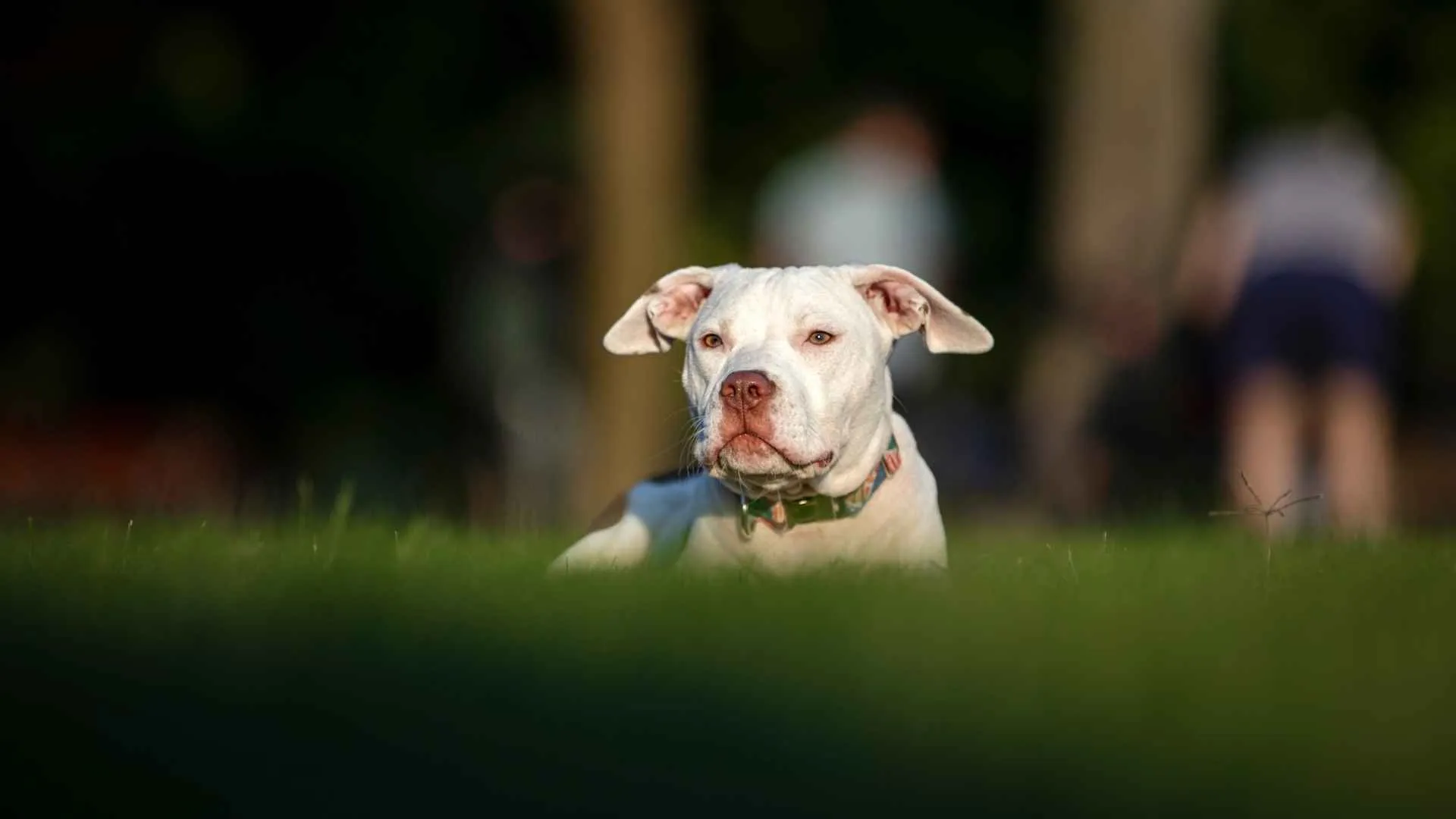
Don’t let the tough exterior fool you — the American Staffordshire Terrier (AmStaff) is a marshmallow wrapped in muscle.
Often mistaken for aggressive due to their build, those who know AmStaffs will tell you: these dogs are lovers, not fighters. They’re deeply loyal, people-oriented, and incredibly intuitive.
Because they form strong bonds with their humans, AmStaffs can make fantastic emotional support and psychiatric service dogs. They’re brave, confident, and always watching your back. Plus, they love a good cuddle session — even if they weigh 60 pounds and have zero understanding of personal space.
Why is AmStaff a secret emotional support animal
✔️ Emotionally attuned — they’ll sense your mood like doggie therapists
✔️ Brave and strong — great for physical support and anxiety alerts
✔️ Unshakeable loyalty — once you’re theirs, they’re all in
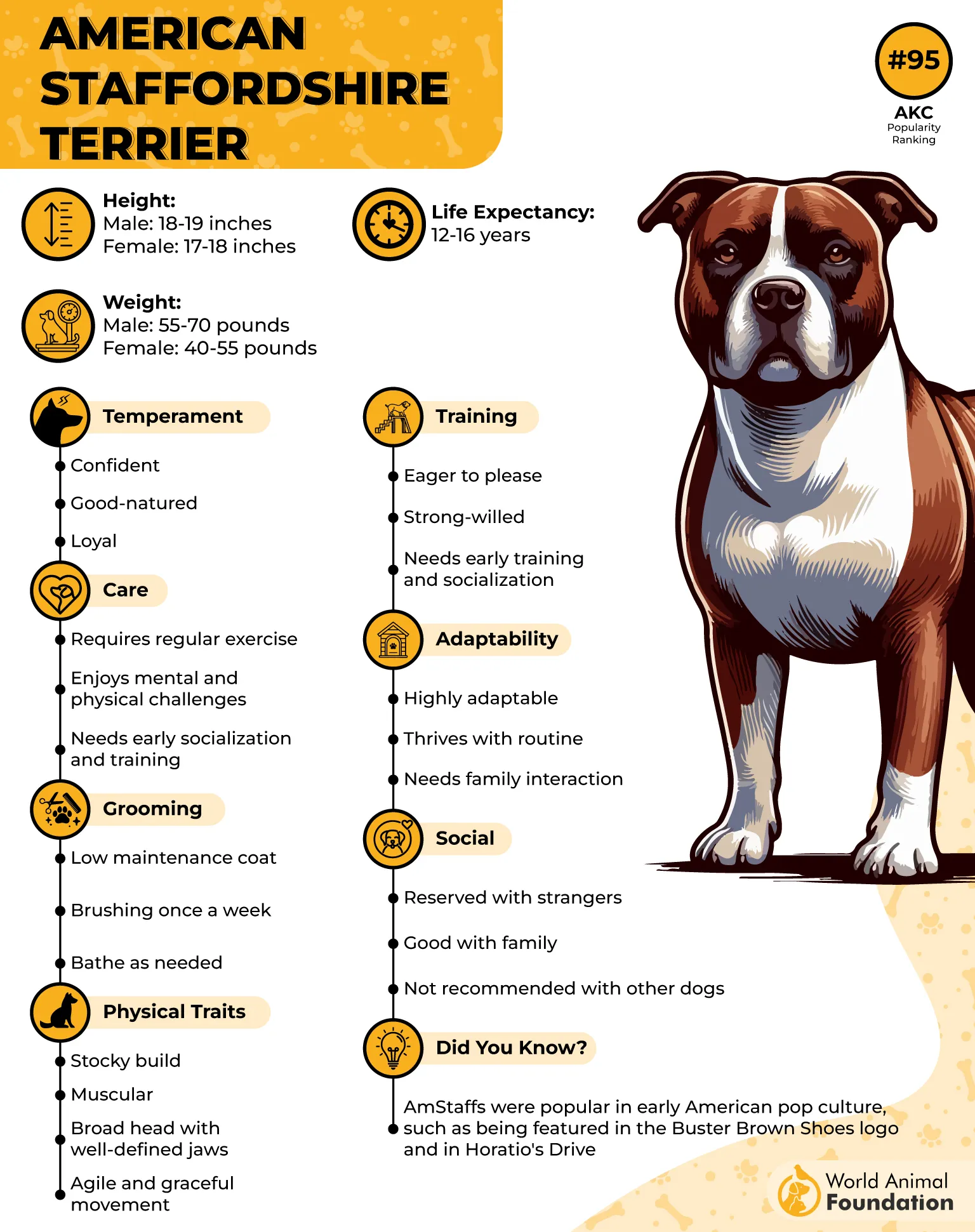
American Staffordshire Terriers are deeply loving and affectionate with their families, but can be a bit reserved around strangers. American Staffordshire Terriers are a naturally athletic breed that requires plenty of exercise to keep them happy and healthy.
Aim for at least 60 minutes of activity a day, which can be split into smaller sessions to suit both your and your dog’s schedule.
American Staffordshire Terriers are strong-willed but eager to please, making them quick learners with the right training approach. While they can be trained efficiently, keeping their attention can be a challenge, so using engaging methods and consistency is key.
7. Cavalier King Charles Spaniel
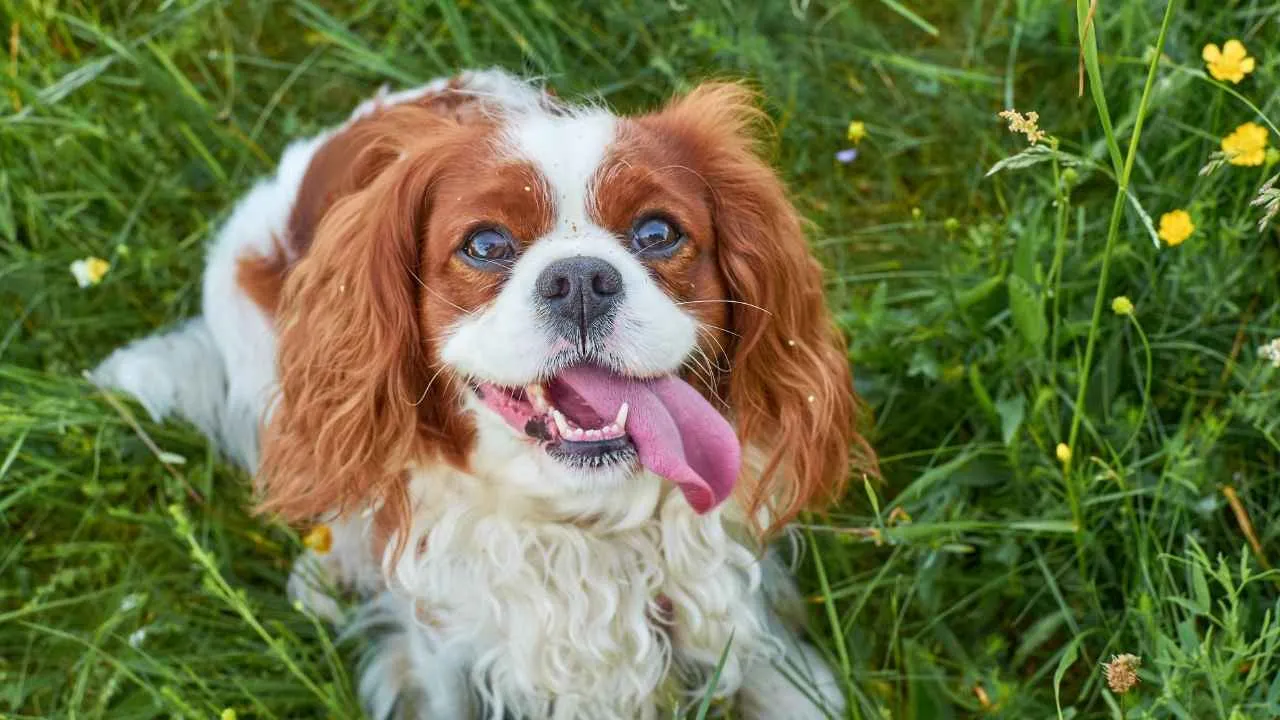
If ever there was a dog born to be a lap therapist, it’s the Cavalier King Charles Spaniel. These little aristocrats don’t need crowns — they just need a couch, a lap, and your undivided affection. Known for their big, soulful eyes and affectionate nature, Cavaliers are expert snugglers and world-class mood boosters.
They might be small, but their emotional intelligence is massive. Cavaliers are often used as emotional support and psychiatric service dogs, especially for people dealing with anxiety, depression, or PTSD, as they form deep emotional bonds. They don’t bark much, love children, and have never met a stranger they didn’t like.
Why Cavaliers are the best service dogs
✔️ Lovingly clingy — will follow you like a furry shadow with a tail
✔️ Calm and gentle — perfect for quiet environments and sensitive individuals
✔️ Small but adaptable — couch? Apartment? Lap? Yes, please
They’re the kind of dogs who’d whisper,
“I shall now take over your lap. You may thank me with belly rubs.”
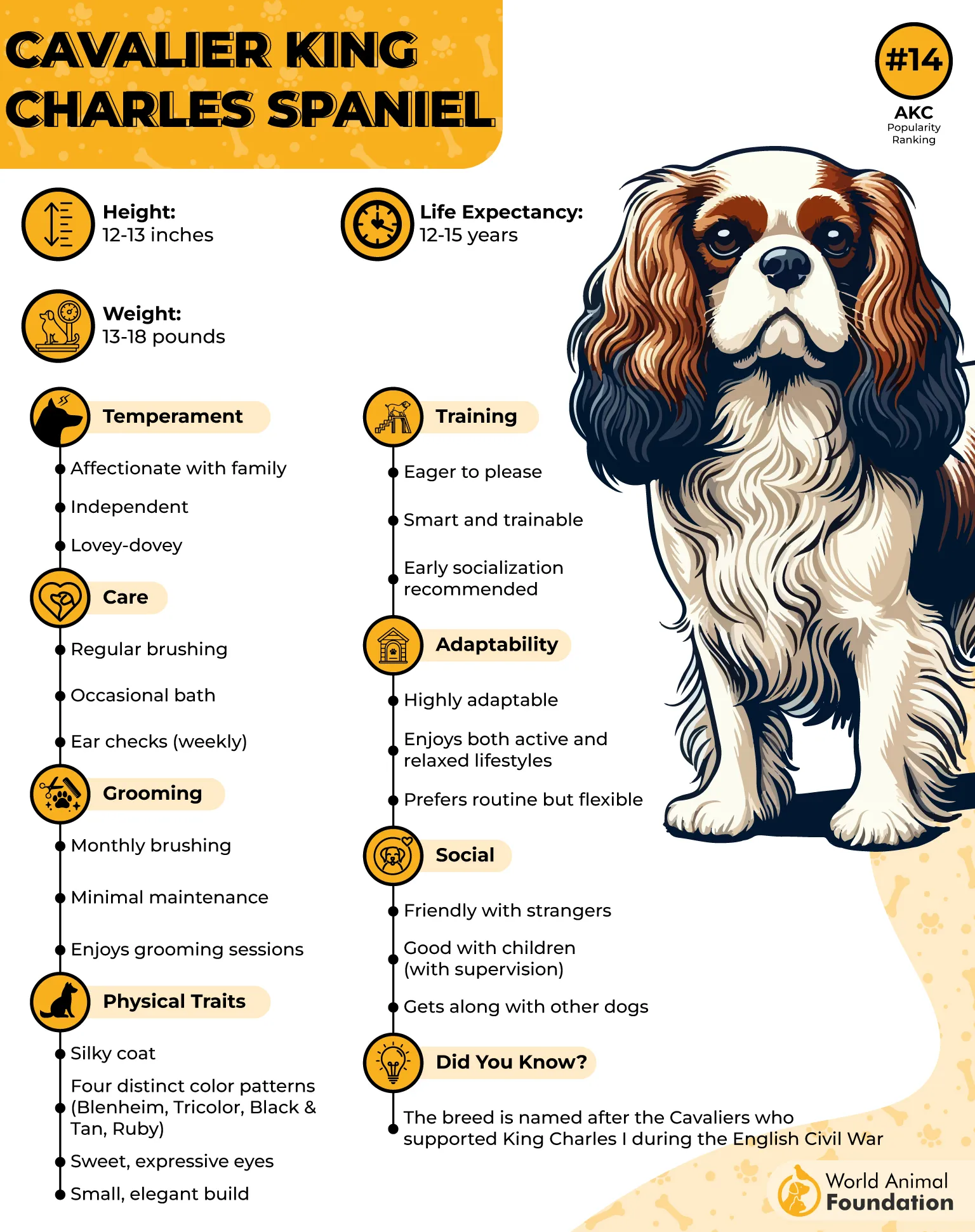
They typically thrive around people and other dogs, and their affectionate nature makes them ideal for families or households where they often won’t be left alone. Their gentle and manageable energy levels also make them a favorite among seniors.
This small dog enjoys daily walks of 30 to 60 minutes, but many benefit from additional exercise to stay physically and mentally stimulated.
If you’re after a low-maintenance grooming dog, a Cavalier might not be your best match. Their feathered ears and feet require regular attention to prevent tangling or matting, so expect to spend some time keeping their coat in tip-top shape.
Conclusion
Devoted service dog breeds are more than just pets—they’re highly trained, loving companions who provide life-changing support to their owners. With proper service dog training, these dogs are taught to perform specific tasks that assist with mobility, psychiatric support, or aiding the hearing impaired, making them essential to a treatment plan.
Common breeds like German Shepherd Dogs, Border Collies, German Shepherd dogs, and Standard Poodles are well-suited for service work due to their intelligence, physical ability, and devoted nature. Large breed dogs such as Bernese Mountain Dogs and Great Danes bring strength and stability, while smaller breeds like Toy Poodles offer assistance in more compact packages and require regular grooming.
Many breeds, when trained specifically, can succeed in service roles—whether it’s opening doors, retrieving items, or providing emotional support. These dogs are not only good service dog but beloved family dogs, forming strong bonds and offering unconditional love to their owners. From protective instincts to a gentle, loving nature, these devoted companions are a vital part of many lives—quiet heroes who serve with heart and loyalty every single day.


